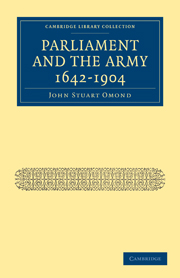Summary
In 1873, as a result of a ministerial crisis, Gladstone became Chancellor of the Exchequer as well as First Lord of the Treasury. He demanded reductions in the naval and military estimates for the next financial year, but Goschen and Cardwell as the ministers responsible for the two services, were unable to agree with his proposals. The deadlock thus produced was suddenly brought to an end by Gladstone's announcement of a dissolution in January, 1874.1 The Conservative party, led by Disraeli, who had picturesquely described the Liberal ministers in a speech at Manchester nearly two years before as “a range of exhausted volcanoes”, won a substantial victory at the ensuing general election. Gladstone resigned office and was succeeded by Disraeli as Prime Minister. The major pre-occupation of the new government in the six years between 1874 and 1880 lay in the field of international affairs, while the army enjoyed what Lord Wolseley called “six years of peace”. It is possible that the interest in military matters aroused by the events of 1866 and 1870-1 had already begun to wane, and that the old spirit of apathy and neglect of military matters was beginning to reassert itself in contrast to the reforming activities introduced during Lord Cardwell's regime at the War Office. The hope of educating the public to take and maintain anything more than the most fleeting interest in the crucial question of defence during a period when this country's relations with foreign powers in Europe were undisturbed by any actual hostilities, was never great.
- Type
- Chapter
- Information
- Parliament and the Army 1642–1904 , pp. 125 - 158Publisher: Cambridge University PressPrint publication year: 2009First published in: 1933

